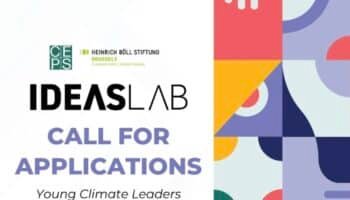Applications are open for MIT Solve Global Climate Challenge 2025. MIT Solve seeks exceptional solutions that leverage technology to address any aspect of the climate crisis with a particular interest for 2025 in solutions that:
- Drive a shift towards a low-carbon and nutritious global food system, across large and small-scale producers plus supply chains.
- Build zero-carbon and resilient cities, including through better construction or retrofitting of multi-family or commercial buildings, enabling non-car transportation, and managing extreme weather.
- Enable rapid deployment of distributed renewable energy and adaptation measures, such as community-scale solar, ecosystem restoration, or cooling/dehumidification.
- Strengthen a low-carbon blue economy, including sustainable fisheries and aquaculture, marine industry, or ecosystem conservation.
MIT Solve Global Climate Challenge Categories
- MIT Solve – Solver Award: All Solver teams selected for Solve’s Global Challenges and the Indigenous Communities Fellowship will receive a grant funded by Solve.
- The Seeding The Future Food Systems Prize: The Seeding the Future Food Systems Prize is open to high impact innovations focusing on transforming food systems to be more sustainable, and to enable equitable access to safe and nutritious food that is affordable and trusted.
- The E Ink Innovation Prize: The E Ink Innovation Prize is open to solutions that currently utilize or propose to utilize ePaper materials, technology, or displays to address problems of global importance in any of Solve’s areas of impact, including topics such as architecture, education, or intercultural understanding.
- The AI for Humanity Prize: The AI for Humanity Prize is open to solutions leveraging data science, artificial intelligence, and/or machine learning to benefit humanity.
- The GM Prize: The GM Prize is open to solutions that help create smart, safe, and sustainable communities around the world.
- The Citizens Workforce Innovation Prize: The Citizens Workforce Innovation Prize seeks to accelerate the development of solutions that will prepare people for today’s opportunities and the workplace of the future, advance new ways of working, and drive economic impact within communities.
- The Crescent Enterprises ‘AI for Social Innovation’ Prize: The Crescent Enterprises ‘AI for Social Innovation’ Prize supports groundbreaking solutions that leverage data science, artificial intelligence, and machine learning to tackle critical global social challenges.
Categories Prize
- MIT Solve – Solver Award: $10,000
- The Seeding the Future Food Systems Prize: up to $150,000
- The E Ink Innovation Prize: up to $100,000
- The AI for Humanity Prize: up to $150,000
- The GM Prize: up to $150,000
- The Citizens Workforce Innovation Prize: up to $100,000
- The Crescent Enterprises ‘AI for Social Innovation’ Prize: up to $100,000
MIT Solve Global Climate Challenge Benefits
- Funding
- $10,000 prize from Solve
- Access to a pool of +$1.5M in prize funding at selection and additional funding opportunities throughout the program and after.
- Nine-month support program
- Tailored capacity-building workshops covering marketing, public relations, monitoring and evaluation, business model, and more;
- Leadership coaching;
- Access to in-kind and pro bono resources such as software licenses and legal services;
- Monitoring and evaluation support to build an impact measurement practice;
- A powerful network of impact-minded leaders across industries and sectors, including MIT, with dedicated spaces to meet year-round;
- Attendance at two flagship events in New York City in September and Cambridge in May;
- Exposure in the media and speaking opportunities at conferences;
- Connections with past Solver teams for peer-to-peer support, inspiration, and guidance
Duration
Selected Solver teams should expect to commit 25 hours to the program over the course of nine months, inclusive of coaching sessions, workshops, virtual events, etc. Additionally, attendance to MIT Solve flagship events is usually four days for Solve Challenge Finals in New York City (September) and four days for Solve at MIT in Cambridge (May).
Eligibility Criteria for MIT Solve Global Climate Challenge
- Solve seeks innovative, human-centered, tech-based solutions to their Global Challenges. Through open innovation, Solve is looking for a diverse portfolio of solutions across geography, development stage, and team members’ gender and background. They encourage people of all backgrounds to submit applications.
Evaluation Criteria
Solutions will be evaluated along the following criteria:
- Alignment: The solution uses technology to address one of Solve’s Global Challenges.
- Potential for Impact: The planned solution implementation has the potential to impact the intended population.
- Feasibility: The team has a realistic, practical plan for implementing the solution, and it is feasible in the given context.
- Innovative Approach: The solution includes a new technology, a new application of technology, a new business model, or a new process for solving the Challenge.
- Human-Centered Design: The solution is designed with and for underserved communities, and the solution team demonstrates proximity to the community.
- Scalability: The solution has a plan for financial viability and the potential to be scaled to affect the lives of more people.
- Partnership Potential: The applicant clearly explains how the solution would benefit from the broad range of resources that the Solve community is positioned to provide.
- Technical Feasibility: If the underlying technology is novel, the applicant has provided convincing evidence that it has been built and functions as they claim it does.
How To Apply for MIT Solve Global Climate Challenge
Application Deadline: 17 April 2025
Elevate Your Business With Our Expert Services!







